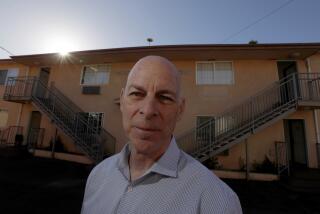Seapointe Lawsuits Called Likely
- Share via
It’s likely that lawsuits will be filed by federal regulators against several parties connected with failed Seapointe Savings & Loan in Carlsbad, according to sources familiar with the case.
Of keenest interest, sources said, is the relationship of directors Ernest J. Dronenberg Jr., a state Board of Equalization member, and William Stubblebine, chairman of the Economics Department at Claremont College.
Both men are directors of the YES Fund, a mutual fund managed by Strategic Investment Services (SIS), the Ontario-based firm that also managed investments for Seapointe.
Seapointe lost $21 million in a two-week period earlier this year from highly speculative, financial options trades reportedly managed by SIS. Seapointe, seized last month by the Federal Savings & Loan Insurance Corp., is now operated as a branch of Monterey Savings Bank of Monterey Park.
Dronenberg was paid between $1,000 and $10,000 as a director of the YES Fund, according to his financial disclosure statements filed with the state.
“There were several different kinds of affiliated transaction violations (that were) inappropriate,” according to one source familiar with the case.
Dronenberg, who works in the Board of Equalization office in San Diego, has, through his attorney, declined comment.
Palomar’s Rady Might Be in the Clear
Word from banking industry sources is that Palomar Savings & Loan President Jim Rady, who also doubles as mayor of Escondido, managed to avoid regulatory violations when Palomar covered a $7,000 overdrawn check he had written last month to the IRS.
Rady disclosed in a deposition connected to his divorce proceedings that a communication snafu with his wife had resulted in a bad check to the taxing agency.
Palomar covered the check, which is a violation of banking regulations, and Rady acknowledged it as such in his deposition. “This problem could result in me losing my job,” he said at the time.
It didn’t, as regulators have reportedly found no wrongdoing, according to industry sources.
As for Rady, who’s been slightly embarrassed over the incident, he’s taking a no-comment position on the whole affair.
Slicing Up a Fashion Valley Building
Try this on for size: For a minimum of $2,000, investors can own a piece of the building that houses the Broadway in Fashion Valley.
El Cajon accountant Richard K. Savage, general partner of the limited partnership marketing the building, says he bought the property for a “reasonably good price” of $6 million--plus the assumption of $3 million in debt--from another partnership. He said he is hopeful of a “good cash flow” because of the 19 years remaining on the lease and because of the Broadway’s high volume.
The arrangement with Carter Hawley Hale, parent of the Broadway, calls for Savage’s partnership to receive 1.5% of the Broadway’s annual gross sales in excess of $24 million. Last year, the store in Fashion Valley reported $33.8 million in sales, $32.9 million in 1984 and $28 million the year before, according to James E. Biddle, president of Securities Center, one of the partnership’s underwriters.
After the lease expires, the partnership will receive 0.5% of sales in excess of $24 million.
The lease is a triple net, meaning that Carter Hawley Hall pays for the mortgage, taxes and operating expenses. The firm also manages the property.
Savage hopes to raise nearly $4 million, and, according to his prospectus, claims he will receive fees of only 1% of the annual proceeds. The expected new tax law won’t affect the offering, Savage said. “This structure is to be an income partnership, not a tax shelter partnership.”
More to Read
Inside the business of entertainment
The Wide Shot brings you news, analysis and insights on everything from streaming wars to production — and what it all means for the future.
You may occasionally receive promotional content from the Los Angeles Times.










